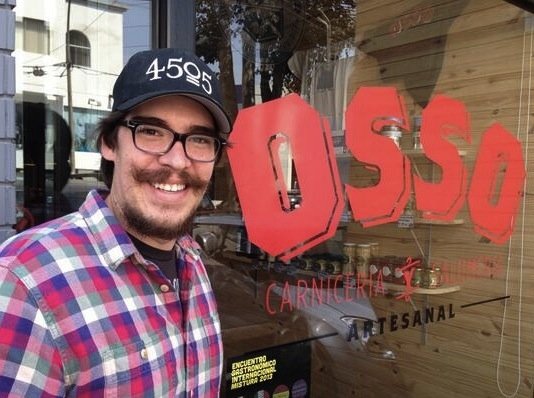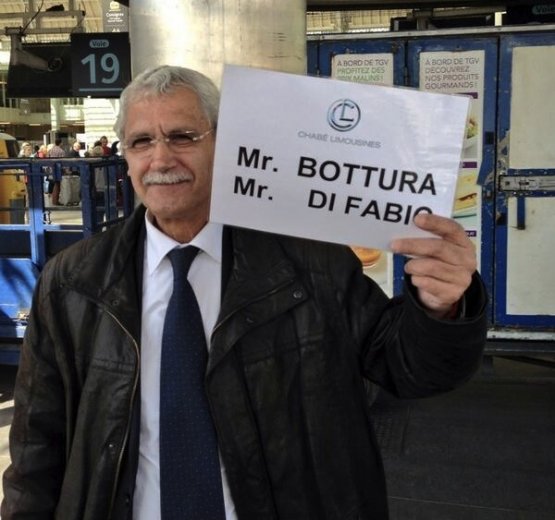In the background, there’s the dull sound of the train. Chef Massimo Bottura is on a Tgv bound to Paris. He’s beaming: «I’ve just left Marseille: we cooked polenta for over 400 people under a circus tent. A fantastic event with the guys from Fulgurances».
Where are you bound now?
To Paris. Alain Ducasse invited us to cook at Meurice, his new hotel restaurant in Rue de Rivoli (the Plaza Athenée, Ducasses’s other famous empire in Paris, will be closed for renovations as of this October, editor’s note).
We’ve called you because you’re back from Mistura in Lima, and we’d like to know what you think of this country and its popular cuisine.
Mistura is an incredible and popular festival. There were five hundred thousand happy people on a scenic stage, an artificial beach built in front of the Pacific Ocean. Thousands of kids arrived from the catering schools of all South America, craving for knowledge and success. I will always keep their smiles in my heart.

Renzo Garibaldi, an Italian-Peruvian guy, owner of Osso, butchery-restaurant in Lima (photo by Massimo Bottura)
Yes, behind this event there’s an excellent touristic development and promotional strategy. This is a beautiful country that has strongly invested in communication. It is the same strategy that was adopted by Brazil, Chile or Denmark. In Italy, instead, the Imu tax is the only topic. The members of our government don’t travel. And they don’t study successful models. Where was the Minister of Agriculture, for instance, during the debate that took place in Marseille, between Carlin Petrini and Pierre Rabhi (an Algerian philosopher-farmer, the theorist of an "Oasis in any place",
editor’s note)? This is what our future depends on.
Let’s go back to Peruvian cuisine, remembering ceviche in one of your most famous dishes, namely All the languages in the world,
before it became so popular.
Indeed, I adore it. So much so that if you visit
La Mar in Lima - an extraordinary place - you can find the
Bottura cocktail extra-menu: it’s a sort of
Carbonara pasta with sea ceviche, served in a Martini glass. Sea urchins are used instead of eggs; instead of bacon, there’s a
concha negra ceviche with a
leche de tigre marinade.
Who are the chefs from the Andes that impressed you the most?
Gastón Acurio, the soul of
Mistura, is a chef but he’s so popular he could easily be the president of the republic. He’s tireless. As for dinner, I thought Virgilio Martinez of
Central was extraordinary. This young man has grown a lot in the space of a year. He’s the author of a marvellous journey among great raw materials. He creates profound dialogues with the palate, without special effects, with intelligent dishes such as
Cube corn, a croquette made with this cereal, with a crispy exterior and a polenta filling. I’ve never tasted such a total version of corn.

Prossimo pick up: Identità New York, sabato 5 ottobre, con Daniel Boulud
There’s a great butcher shop with a table for 8 people in the middle and fantastic meat. It’s called
Osso and it is run by Renzo Garibaldi, a very nice Italian-Peruvian man. It is thinking of the wave of emigration that took place in the 19th century that I presented “The perfect journey from Chiavari to Lima”, during
Gelinaz. This dish mixes the absolute Mediterranean character of tomato with a spaghetto – the top of Italian design – made with 7 kinds of potatoes from the Andes. A dessert-version of spaghetti.
In a few days time you’ll be at Identità New York, holding a lecture with Daniel Boulud.
I’m very happy because we’ve been friends for over 25 years, when he was the chef at Le Cirque. Our friendship is based on sharing experiences: in his kitchen he uses my Balsamic Vinegar, while he introduced me
Vik Muniz, an artist from Sao Paulo who creates sculptures with urban garbage. I have one of his works at
La Francescana. Daniel’s cuisine is very classic, orthodox but also evolved towards something lighter. He’s madly in love with Italy: he spent his honey moon here. I can’t wait.